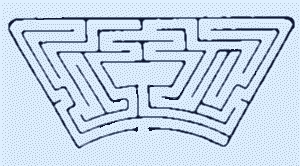

Hampton Court Maze
Every maze is clearly equivalent to a graph:
set the vertices at the conjunctions and the edges along the paths.
The oldest surviving hedge maze in Britain is the
maze at Hampton Court.
Traversability of mazes was an issue for a time.
The question is whether there exist an algorithm
that would allow one to pass through a maze
going every path twice (in opposite directions)
without knowing its structure in advance.

The first algorithm allowing to traverse a maze is due to C. Wiener, 1873.
More effective algorithm comes from Tremaux, (pub 1882).
The simplest (and best) algorithm was proposed by Tarry, 1895.
(see W. Rouse Ball, Mathematical recreations and essays).

The harmonic evolution
digraph of the Hampton maze consists of great number of loops:
Tree = T1
Loops = 2L1
+ L2
+ 2L3
+ 3L4
+ 9L6
+ 30L8
+ 15L12
+ 48L16
+ 150L24
+ 240L48
Home



![]()